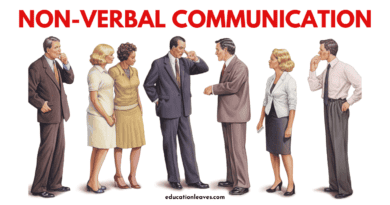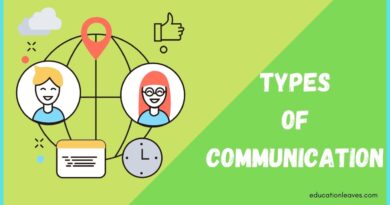Communication Skills – Importance and Examples
Communication skills are the abilities you use when giving or receiving any kind of information. These skills allow you to understand or be understood by others. These involve speaking, listening, observing, and empathizing. Communication skills help you understand the differences in how to communicate through face-to-face interactions, digital communications (chat, email, text message), and telephonic conversations.
What you are going to learn?
Importance of Good Communication Skills
Developing good communication skills helps you in all aspects of your life, including your personal, professional, and social life.
In Professional Life:
If you are applying for any job or looking for a promotion in your workplace, first, you need to learn a range of good communication skills and then develop them. The ability to speak, listen, question, and conciseness are the most essential skills for managers and leaders. These skills are helpful in communicating with a wide variety of people related to your workplace.
In Personal Life:
Good communication skills help to understand others’ feelings and that helps to improve your personal relationships. These skills also help you to be understood. Failure to talk with confidence can cause the breakdown of any partnerships and relationships. These skills are also vital while communicating within your family.
In Organizational Purpose:
In your daily life, you have to interact with a wide range of organizations and businesses including shops, government offices, educational institutions, etc. Good communication skills ensure you can manage these kinds of interactions with ease.
Examples of Communication Skills
Here are some different types of communication skills that help you become an effective communicator. Highlight these skills you can make a solid first impression.
Active Listening
Active listening requires paying close attention to what others are saying and asking questions to show interest and understanding. This promotes effective communication while simultaneously allowing us to show appreciation and establish relationships with the person with whom we are communicating.
You can also be an active listener by paying attention to the speaker, avoiding distractions like phone calls, using laptops, and asking relevant questions, comments, or ideas to correctly respond.
Friendliness
Honesty and kindness often foster trust and understanding. With a friendly tone and a simple smile, you can encourage your co-workers to engage in free and honest communication with you. It is necessary to be polite while you are in your workplace communications. Small gestures like asking your co-workers or neighbors how they’re doing, smiling gently when they speak, or offering praise for work well done can help you foster effective relationships with both colleagues and managers as well as your neighbors.
Maintain Correct Posture
From our shoulders to our toes, how we position ourselves is far more significant than you may think in nonverbal communication. There is a sentence, “Stand tall, be proud”. When you stand up straight and push your shoulders forward, it will reflect your self-confidence and authority. Always remember that your gaze should be at eye-level with the interviewer and keep your legs uncrossed.
Confidence
Everyone responds to those ideas that are presented with confidence. There are so many ways to show confidence, such as making eye contact when addressing someone, sitting up straight with shoulders open, speaking with a firm but friendly tone, preparing ahead of time, and avoiding making statements sound like questions.
Presentation
Having good presentation skills doesn’t only mean you are good at presenting a PowerPoint presentation before your boss, manager, and colleagues, but also about how you present your ideas and intentions in your workplace or about how you present yourself before an interviewer.
Presentation skills are useful for all kinds of situations including:
- Tourist guides explain to the tourists why the place is significant and what are the attractions of that place.
- Software engineers demonstrate how their code works.
- A teacher explains a topic before his students.
Feedback
Both giving and receiving feedback are skills that are as important as active listening, giving respect and confidence. You can’t provide encouraging feedback without really listening and understanding what the speaker means. Also, you don’t get good feedback until you can fully express your thoughts to the person in front of you.
Always remember, when you are receiving feedback from a supervisor, accept the opinion without any judgment even if you do not agree. Make sure that you wouldn’t interrupt them. Being able to give or take feedback accordingly is pretty much helpful for the growth of your career.
Respect
Respect is one of the principles of successful communication. It involves active listening and patience and it is crucial if you are looking for any type of job. Being respectful is about letting others speak and knowing when to start a conversation or respond. Communicating respectfully also means using your time with someone else wisely – staying on topic, asking logical questions, and reacting fully to questions you’ve been asked.
Clarity
Clarity is an essential part of oral communication. It involves developing your thoughts logically and using the proper words to convey them as productively as possible.
Making your message as simple as possible reduces the chance of misunderstandings, speeds up projects, and helps others quickly understand your objectives. Instead of expressing in lengthy, detailed sentences, practice reducing your message to its actual core meaning. While providing context is helpful, it is best to give the most vital information when trying to communicate your idea, advice, or message.
Empathy
Being able to understand and share the emotions of others is called empathy. It is the art of seeing the world as others see it. Empathy helps us to get through our ideas in a way that makes sense to others, and it helps us know others when they communicate with us. This skill is applicable for both person-to-person and team. In both conditions, you need to understand others’ emotions and choose a proper response.
Some people have excellent empathy that they can tell how someone is feeling just by looking at them. Some people don’t have this skill and they won’t notice how you’re feeling until you fully expressed it.
Honesty
Honesty is not only a skill, it is a quality that you should strive to incorporate in all aspects of your professional and personal life. Being honest with your colleagues and supervisors about anything work-related shows that you value transparency and are ready to accept your mistakes and take responsibility for your actions.
Nonverbal Communication
Communication is much more than just speaking. Besides speaking, it involves posture, gestures, tone of voice, eye contact, body language, and facial expressions. Sometimes, nonverbal communication plays a more vital role in gaining trust from your clients and co-workers than verbal communication.
Nonverbal communication improves a person’s ability to engage, relate, and establish meaningful interactions in daily life. A better understanding of this skill may lead you to develop stronger relationships with others.
Written Communication
Clear messages always help to build trust between the reader and the sender. Well-written communications help to define objectives, analyze problems and find solutions. Whatever your medium of written communication, that should have a professional tone as well as the best choice of words and solid grammatical skills.

How to Improve Communication Skills
As everyone knows, “practice makes you perfect”. So, there is no better way to improve communication skills than practice and experience. First, start identifying your strengths and weaknesses. Then start developing your weak areas.
Here are some methods to improve your communication skills:
1. Ask For Feedback:
There is no distress in asking someone for honest feedback and constructive criticism. Asking your close friends and subordinates for their advice on improving your communication skills. Seeking others’ points of view helps to build better relationships with your coworkers.
2. Listen Properly:
Everyone love to know that they are being heard. Always try to listen to what the other person is saying instead of throwing your opinion in the middle of the discussion. If you don’t understand, then ask for clarification to avoid misunderstanding. While you’re listening to others, the person should be the most important person to you.
3. Who You are Talking To Matters:
It is okay to use informal language while talking to your buddy, but if you’re communicating with your boss, then don’t use any informal language such as “what’s up”, TYSM”, “bro”, “hey”, etc.
On the other hand, if you communicate with your friend in pure formal language, you don’t find the real taste of your conversation. So, make sure whom you are talking to, then decide which language is appropriate for your conversation.
4. Focus on Nonverbal Communication:
Understanding nonverbal cues and signals can help you prevent miscommunication. Your body can tell how much you’re paying attention. So, pay attention to your body language, facial expressions, and eye contact while you are speaking in a professional meeting.
5. Think Before You Speak:
Always pause before you say something important. Don’t say the first thing that comes to your mind. Before speaking, always take a moment and pay close attention and think about what you’re going to speak. In this way, you can avoid embarrassment easily.
6. Practice improving Communication Habits:
Practice makes a man perfect. First, find out your strengths and weaknesses and then start practicing to improve your weak areas. For better result, you can also use a mirror and start communicating with yourself the way you communicate with others.
7. Maintain a Positive Attitude
When communicating with someone, always maintain a positive attitude, even when you are speaking on a phone call. Always keep smiling while talking to someone. It will reflect your personality and most of the time people will respond positively to you.
Communication Skills PDF
Related Terms:
What is Communication?
Communication is the act of transmitting information from one person, group, or place to another.
Each communication requires at least one sender, one recipient, and a message. Maybe it sounds natural, but actually, communication is an extremely complex subject.
The transmission of the message from the sender to the recipient can be disturbed by a lot of barriers. These include our cultural conditions, emotions, location, and the instrument used to communicate. For these barriers, accurate, effective and obvious communication is actually quite hard. Read More >>>
Importance of Communication
Some of the primary targets of communication are to convey information like rules, policies, procedures, decisions, etc., so the audience can read, hear and understand what is said and accept the message.
Communication facilitates a group of people to think and act together. Without communication, there will be no society. Poor communication leads to unsatisfactory coordination, and similarly, cooperation depends on communication. Read More>>>





Pingback: Emotional Intelligence: Definition, Skills, Testing, Benefits, Relation to management & Leadership [PDF Included] - EDUCATIONLEAVES
Pingback: Types of Communication: a detailed Discussion - EDUCATIONLEAVES
Pingback: What is Sales Management? [PDF inside] Definition, Process, Strategies, Objectives, & Benefits - EDUCATIONLEAVES